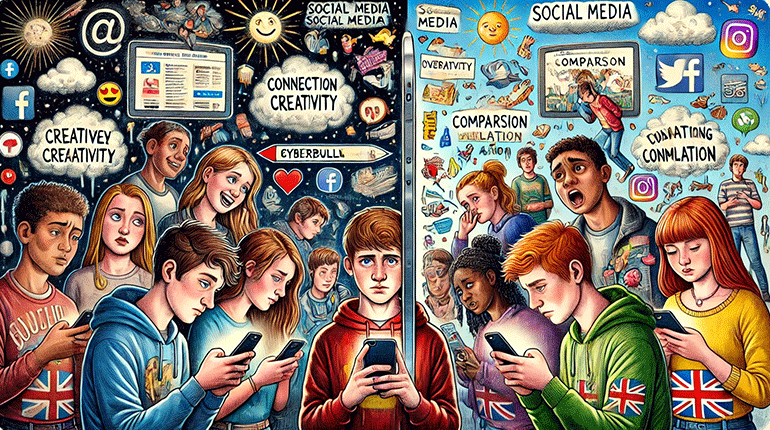The Impact of Social Media on Teen Mental Health in Britain
Introduction
Social media has revolutionized communication and self-expression, becoming an integral part of modern life, especially for teenagers. In Britain, nearly all teens have access to smartphones and social media platforms, making these digital spaces a significant influence on their daily lives. While social media offers opportunities for connection, learning, and creativity, it also introduces challenges such as cyberbullying, body image issues, and addiction. These factors have raised concerns about its impact on teen mental health, requiring a nuanced examination of both the benefits and potential harms.
The Prevalence of Social Media Among Teens
In Britain, over 90% of teenagers use social media, with platforms like Instagram, TikTok, and Snapchat dominating their screen time. Social media serves as a primary means of social interaction, entertainment, and information sharing for this demographic. However, this constant engagement raises questions about its psychological effects, as teens navigate their formative years in an environment shaped by likes, shares, and comments.
Positive Effects of Social Media
Social media offers several benefits that can positively impact teen mental health when used responsibly.
1. Connection and Community Building
Social media helps teens stay connected with friends and family, even over long distances. It enables the creation of communities where young people with shared interests, hobbies, or struggles can interact and support each other. For marginalized groups, such as LGBTQ+ teens, social media often provides a safe space to find acceptance and solidarity.
2. Access to Information and Resources
Social media platforms can be powerful tools for learning and self-improvement. Teens can access educational content, mental health resources, and inspirational stories that encourage personal growth. Campaigns promoting mental health awareness often reach young audiences through these platforms.
3. Creativity and Self-Expression
Many teens use social media as a creative outlet, sharing art, music, writing, or personal achievements. This form of self-expression can boost confidence and provide a sense of accomplishment when their efforts are appreciated by their peers.
Negative Effects of Social Media
1. Comparison and Low Self-Esteem
One of the most pervasive issues associated with social media is the tendency to compare oneself with others. The curated nature of social media content often presents an idealized version of reality, leading teens to feel inadequate about their appearance, achievements, or lifestyle. This constant comparison can erode self-esteem and contribute to feelings of depression.
2. Cyberbullying and Harassment
Cyberbullying is a significant concern for British teens. Unlike traditional bullying, it follows the victim into their private space and can happen at any time. Hurtful comments, rumors, or explicit threats can severely affect a teen’s mental health, leading to anxiety, social withdrawal, or even suicidal thoughts.
3. Addiction and Screen Time Issues
Excessive use of social media can become addictive, disrupting sleep patterns, reducing physical activity, and negatively affecting academic performance. Teens often feel pressured to remain constantly connected, leading to burnout and stress from managing their online presence.
4. Exposure to Harmful Content
Teens are sometimes exposed to harmful content, such as pro-anorexia or self-harm communities, which can normalize unhealthy behaviors. Despite efforts by social media companies to regulate such content, gaps in moderation persist, putting vulnerable teens at risk.
Impact on Mental Health
The cumulative effects of social media on teens’ mental health are significant. Studies in Britain have linked heavy social media use with increased rates of anxiety, depression, and loneliness. Teens who spend more time online often report feeling less satisfied with their lives, highlighting the complex relationship between screen time and emotional well-being.
Strategies to Mitigate Negative Effects
1. Encouraging Healthy Use of Social Media
Parents, educators, and policymakers should promote balanced and mindful social media use. Setting limits on screen time, encouraging regular breaks, and fostering offline activities can help teens maintain a healthier relationship with technology.
2. Promoting Digital Literacy
Teaching teens critical thinking skills to recognize unrealistic portrayals and harmful content on social media can empower them to use these platforms more responsibly. Digital literacy programs should be integrated into school curriculums to equip young people with the tools to navigate the digital world safely.
3. Strengthening Support Systems
Parents, teachers, and mental health professionals must provide supportive environments where teens feel comfortable discussing their online experiences. Open communication can help identify and address issues like cyberbullying or unhealthy comparisons early.
4. Enforcing Platform Accountability
Social media companies must take greater responsibility for their impact on mental health. This includes stricter content moderation, enhanced privacy settings for teens, and transparent policies on the use of algorithms that amplify harmful content. Collaboration with mental health organizations to design safer platforms is essential.
5. Access to Mental Health Resources
Expanding access to mental health resources tailored for teens, both online and offline, can help those affected by social media challenges. Schools should offer counseling services, while community initiatives can provide peer support networks.

